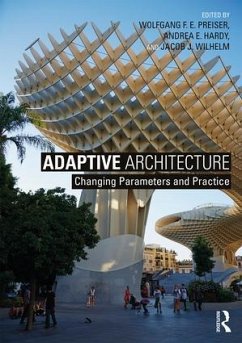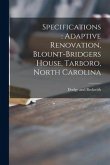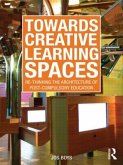Adaptive Architecture
Changing Parameters and Practice
Herausgeber: Preiser, Wolfgang F. E.; Wilhelm, Jacob J.; Hardy, Andrea E.
75,99 €
inkl. MwSt.
**Unverbindliche Preisempfehlung des Herstellers
Versandkostenfrei*Versandfertig in 1-2 Wochen

38 °P sammeln
Adaptive Architecture
Changing Parameters and Practice
Herausgeber: Preiser, Wolfgang F. E.; Wilhelm, Jacob J.; Hardy, Andrea E.
- Broschiertes Buch
- Merkliste
- Auf die Merkliste
- Bewerten Bewerten
- Teilen
- Produkt teilen
- Produkterinnerung
- Produkterinnerung
The constant in architecture's evolution is change. Adaptive Architecture explores structures, or environments that accommodate multiple functions at the same time, sequentially, or at periodically recurring events. It demonstrates how changing technological, economic, ecological and social conditions have altered the playing field for architecture from the design of single purpose structures to the design of interacting systems of synergistically interdependent, distributed buildings. Including contributors from the US, UK, Japan, Australia, Germany and South Africa, the essays are woven into…mehr
Andere Kunden interessierten sich auch für
![Adaptive Sensory Environments Adaptive Sensory Environments]() Maria Lorena LehmanAdaptive Sensory Environments74,99 €
Maria Lorena LehmanAdaptive Sensory Environments74,99 €![Specifications: adaptive Renovation, Blount-Bridgers House, Tarboro, North Carolina Specifications: adaptive Renovation, Blount-Bridgers House, Tarboro, North Carolina]() Specifications: adaptive Renovation, Blount-Bridgers House, Tarboro, North Carolina24,99 €
Specifications: adaptive Renovation, Blount-Bridgers House, Tarboro, North Carolina24,99 €![Future Visions of Urban Public Housing (Routledge Revivals) Future Visions of Urban Public Housing (Routledge Revivals)]() Future Visions of Urban Public Housing (Routledge Revivals)84,99 €
Future Visions of Urban Public Housing (Routledge Revivals)84,99 €![The Green Braid The Green Braid]() Rafael Longoria / Kim Tanzer (eds.)The Green Braid74,99 €
Rafael Longoria / Kim Tanzer (eds.)The Green Braid74,99 €![Loose Space Loose Space]() Karen Franck / Quentin Stevens (eds.)Loose Space77,99 €
Karen Franck / Quentin Stevens (eds.)Loose Space77,99 €![Towards Creative Learning Spaces Towards Creative Learning Spaces]() Jos BoysTowards Creative Learning Spaces67,99 €
Jos BoysTowards Creative Learning Spaces67,99 €![Architecture, Animal, Human Architecture, Animal, Human]() Catherine T. IngrahamArchitecture, Animal, Human70,99 €
Catherine T. IngrahamArchitecture, Animal, Human70,99 €-
-
-
The constant in architecture's evolution is change. Adaptive Architecture explores structures, or environments that accommodate multiple functions at the same time, sequentially, or at periodically recurring events. It demonstrates how changing technological, economic, ecological and social conditions have altered the playing field for architecture from the design of single purpose structures to the design of interacting systems of synergistically interdependent, distributed buildings. Including contributors from the US, UK, Japan, Australia, Germany and South Africa, the essays are woven into a five-part framework which provides a broad and unique treatment of this important and timely issue.
Hinweis: Dieser Artikel kann nur an eine deutsche Lieferadresse ausgeliefert werden.
Hinweis: Dieser Artikel kann nur an eine deutsche Lieferadresse ausgeliefert werden.
Produktdetails
- Produktdetails
- Verlag: Routledge
- Seitenzahl: 302
- Erscheinungstermin: 29. August 2017
- Englisch
- Abmessung: 244mm x 170mm x 16mm
- Gewicht: 525g
- ISBN-13: 9781138647275
- ISBN-10: 1138647276
- Artikelnr.: 49085278
- Herstellerkennzeichnung
- Libri GmbH
- Europaallee 1
- 36244 Bad Hersfeld
- gpsr@libri.de
- Verlag: Routledge
- Seitenzahl: 302
- Erscheinungstermin: 29. August 2017
- Englisch
- Abmessung: 244mm x 170mm x 16mm
- Gewicht: 525g
- ISBN-13: 9781138647275
- ISBN-10: 1138647276
- Artikelnr.: 49085278
- Herstellerkennzeichnung
- Libri GmbH
- Europaallee 1
- 36244 Bad Hersfeld
- gpsr@libri.de
Wolfgang F.E. Preiser holds a Ph.D. in Man-Environment Relations from Penn State, and several architecture degrees from Virginia Tech, Karlsruhe Tech (Germany) and Vienna Tech (Austria). He has over 40 years of experience in teaching, research and consulting in the evaluation and programming of environments, including health care facilities, public housing, public libraries, cross-cultural and universal design, as well as design research in general. He has published 20 books and over 130 chapters, monographs, and articles. Most recent books include: Architecture Beyond Criticism: Expert Judgment and Performance Evaluation (Routledge, 2015); Enhancing Building Performance (Wiley, 2012); Universal Design Handbook (McGraw-Hill, 2010); Designing for Designers: Lessons Learned From Schools of Architecture (Fairchild, 2007). Preiser has lectured worldwide at 69 venues and conferences in the United States and Canada, as well as 86 overseas. He has served on national committees with the American Institute of Architects, the Building Research Board of the National Academy of Sciences, and the National Institute for Disability Rehabilitation Research. Preiser has received many awards, including: 2 Progressive Architecture Awards; 2 Professional Fellowships from the National Endowment for the Arts; The Career Award from the Environmental Design Research Association (EDRA), 2 EDRA Achievement Awards, as well as other awards while at the University of Cincinnati. Andrea E. Hardy, Creo Architects, holds a Master's degree in Architecture from Arizona State University (2012), and a Bachelor of Science in Architectural Engineering Technology from Wentworth Institute of Technology (2007). She has been working in architecture offices for the past twelve years both during and between obtaining her degrees. After working professionally in Boston and Phoenix, and studying public architecture through Arizona State University in Buenos Aires, Argentina, Hardy is currently an Associate and Registered Architect working at Creo Architects in Phoenix, Arizona. While at Arizona State University, Hardy was a member of the American Institute of Architecture Students, served one term as Secretary for the American Institute of Architecture Students, was a teaching assistant for a design studio and history class, received multiple scholarships, and participated in non-academic activities such as working on multiple design competitions, workshops, and volunteer work. Recently, Hardy was published as co-editor and co-author in Architecture Beyond Criticism: Expert Judgment and Performance Evaluation (2015), contributed to updating Improving Building Performance NCARB Monograph series (2016), and is currently working on, as an editor, the forthcoming second edition to Building Performance Evaluation (exp 2017). Jacob J. Wilhelm holds a Bachelor of Science in Design in Architectural Studies from Arizona State University (2016). He is the recipient of many awards and grants based on his work in design and publication. While at Arizona State University, Wilhelm held various leadership roles, serving with Alpha Rho Chi as President and with the American Institute of Architecture Students, Students for the New Urbanism, and the Student Planning Association. Both as an individual and collaborating with students in the fields of Architecture, Industrial Design, Urban Planning, and more, Wilhelm has been awarded in multiple local design competitions as sponsored by Arizona Residential Architects, the Scottsdale Museum of Art, and Arizona State University. He is committed to expanding architectural discourse through interdisciplinary study, research, and theory, and his current focus is in architectural practice and publication.
Foreword Robert Shibley Part 1: Introduction Wolfgang F.E. Preiser, Thomas
Fisher and, Andrea E. Hardy Part 2: Concepts and Processes for Future
Flexibility 1. Challenges of large-scale housing in the developing world
Allison Lenell Magley 2. Predesign planning for flexibility Robert G.
Hershberger 3. Multi-perfomance spaces Ihab M. K. Elzeyadi 4. Mixed-use
development using air rights above the JR train station at Nagoya, Japan
Gen Taniguchi 5. Prospects for adaptive, inclusive design Korydon H. Smith
and Beth Tauke Reflections on Part 2 Michael J. Crosbie Part 3:
Rooms/Settings Scale 6. The measurement and efficiency of adaptive design
strategies William Fawcett 7. Finding the balance Jeffrey L. Morgan 8.
Beyond the cellular office Martin Hodulak 9. Adaptive architecture of the
London Science Museum Kristin Hibbs 10. Post-occupancy evaluation of a
multi-tasking environment Lindsey L. Fay 11.A construct of generosity in
Navajo culture Jaclyn Roessel Reflections on Part 3 Michael J. Crosbie
Part 4: Building Scale 12. Keren or center for blind children with multiple
disabilities in Israel Wolfgang F.E. Preiser and Jacob J. Wilhelm 13.
Omgivning Karin Liljegren and Kelly Kish 14. Strategies for planning,
designing and operating adaptable facilities John P. Petronis, Faye
Whittemore, and Andy L. Aguilar 15. Native meets high-tech Zane Jones 16.
Building with boxes Mia L. C. Anfield Reflections on Part 4 Michael J.
Crosbie Part 5: Urban Scale 17. Reappropriation of city infrastructure
Andrea E. Hardy 18. Concourse to campus Una Rath and Martin Hodulak 19. An
adaptive evolution from Prussian artillery barracks to intelligent campus
buildings Ulrich Schramm 20. A case study on the design of the Scottish
crime campus Gordon Murray 21. Multi-tasking architectural computer
programs Akikazu Kato and Shiho Mori Reflections on Part 5 Michael J.
Crosbie Part 6: Epilogue 22. The International Space Station David Fitts,
Jennifer L. Rochlis, Mihriban Whitmore, and Alexandra Whitmire Appendix
Index
Fisher and, Andrea E. Hardy Part 2: Concepts and Processes for Future
Flexibility 1. Challenges of large-scale housing in the developing world
Allison Lenell Magley 2. Predesign planning for flexibility Robert G.
Hershberger 3. Multi-perfomance spaces Ihab M. K. Elzeyadi 4. Mixed-use
development using air rights above the JR train station at Nagoya, Japan
Gen Taniguchi 5. Prospects for adaptive, inclusive design Korydon H. Smith
and Beth Tauke Reflections on Part 2 Michael J. Crosbie Part 3:
Rooms/Settings Scale 6. The measurement and efficiency of adaptive design
strategies William Fawcett 7. Finding the balance Jeffrey L. Morgan 8.
Beyond the cellular office Martin Hodulak 9. Adaptive architecture of the
London Science Museum Kristin Hibbs 10. Post-occupancy evaluation of a
multi-tasking environment Lindsey L. Fay 11.A construct of generosity in
Navajo culture Jaclyn Roessel Reflections on Part 3 Michael J. Crosbie
Part 4: Building Scale 12. Keren or center for blind children with multiple
disabilities in Israel Wolfgang F.E. Preiser and Jacob J. Wilhelm 13.
Omgivning Karin Liljegren and Kelly Kish 14. Strategies for planning,
designing and operating adaptable facilities John P. Petronis, Faye
Whittemore, and Andy L. Aguilar 15. Native meets high-tech Zane Jones 16.
Building with boxes Mia L. C. Anfield Reflections on Part 4 Michael J.
Crosbie Part 5: Urban Scale 17. Reappropriation of city infrastructure
Andrea E. Hardy 18. Concourse to campus Una Rath and Martin Hodulak 19. An
adaptive evolution from Prussian artillery barracks to intelligent campus
buildings Ulrich Schramm 20. A case study on the design of the Scottish
crime campus Gordon Murray 21. Multi-tasking architectural computer
programs Akikazu Kato and Shiho Mori Reflections on Part 5 Michael J.
Crosbie Part 6: Epilogue 22. The International Space Station David Fitts,
Jennifer L. Rochlis, Mihriban Whitmore, and Alexandra Whitmire Appendix
Index
Foreword Robert Shibley Part 1: Introduction Wolfgang F.E. Preiser, Thomas
Fisher and, Andrea E. Hardy Part 2: Concepts and Processes for Future
Flexibility 1. Challenges of large-scale housing in the developing world
Allison Lenell Magley 2. Predesign planning for flexibility Robert G.
Hershberger 3. Multi-perfomance spaces Ihab M. K. Elzeyadi 4. Mixed-use
development using air rights above the JR train station at Nagoya, Japan
Gen Taniguchi 5. Prospects for adaptive, inclusive design Korydon H. Smith
and Beth Tauke Reflections on Part 2 Michael J. Crosbie Part 3:
Rooms/Settings Scale 6. The measurement and efficiency of adaptive design
strategies William Fawcett 7. Finding the balance Jeffrey L. Morgan 8.
Beyond the cellular office Martin Hodulak 9. Adaptive architecture of the
London Science Museum Kristin Hibbs 10. Post-occupancy evaluation of a
multi-tasking environment Lindsey L. Fay 11.A construct of generosity in
Navajo culture Jaclyn Roessel Reflections on Part 3 Michael J. Crosbie
Part 4: Building Scale 12. Keren or center for blind children with multiple
disabilities in Israel Wolfgang F.E. Preiser and Jacob J. Wilhelm 13.
Omgivning Karin Liljegren and Kelly Kish 14. Strategies for planning,
designing and operating adaptable facilities John P. Petronis, Faye
Whittemore, and Andy L. Aguilar 15. Native meets high-tech Zane Jones 16.
Building with boxes Mia L. C. Anfield Reflections on Part 4 Michael J.
Crosbie Part 5: Urban Scale 17. Reappropriation of city infrastructure
Andrea E. Hardy 18. Concourse to campus Una Rath and Martin Hodulak 19. An
adaptive evolution from Prussian artillery barracks to intelligent campus
buildings Ulrich Schramm 20. A case study on the design of the Scottish
crime campus Gordon Murray 21. Multi-tasking architectural computer
programs Akikazu Kato and Shiho Mori Reflections on Part 5 Michael J.
Crosbie Part 6: Epilogue 22. The International Space Station David Fitts,
Jennifer L. Rochlis, Mihriban Whitmore, and Alexandra Whitmire Appendix
Index
Fisher and, Andrea E. Hardy Part 2: Concepts and Processes for Future
Flexibility 1. Challenges of large-scale housing in the developing world
Allison Lenell Magley 2. Predesign planning for flexibility Robert G.
Hershberger 3. Multi-perfomance spaces Ihab M. K. Elzeyadi 4. Mixed-use
development using air rights above the JR train station at Nagoya, Japan
Gen Taniguchi 5. Prospects for adaptive, inclusive design Korydon H. Smith
and Beth Tauke Reflections on Part 2 Michael J. Crosbie Part 3:
Rooms/Settings Scale 6. The measurement and efficiency of adaptive design
strategies William Fawcett 7. Finding the balance Jeffrey L. Morgan 8.
Beyond the cellular office Martin Hodulak 9. Adaptive architecture of the
London Science Museum Kristin Hibbs 10. Post-occupancy evaluation of a
multi-tasking environment Lindsey L. Fay 11.A construct of generosity in
Navajo culture Jaclyn Roessel Reflections on Part 3 Michael J. Crosbie
Part 4: Building Scale 12. Keren or center for blind children with multiple
disabilities in Israel Wolfgang F.E. Preiser and Jacob J. Wilhelm 13.
Omgivning Karin Liljegren and Kelly Kish 14. Strategies for planning,
designing and operating adaptable facilities John P. Petronis, Faye
Whittemore, and Andy L. Aguilar 15. Native meets high-tech Zane Jones 16.
Building with boxes Mia L. C. Anfield Reflections on Part 4 Michael J.
Crosbie Part 5: Urban Scale 17. Reappropriation of city infrastructure
Andrea E. Hardy 18. Concourse to campus Una Rath and Martin Hodulak 19. An
adaptive evolution from Prussian artillery barracks to intelligent campus
buildings Ulrich Schramm 20. A case study on the design of the Scottish
crime campus Gordon Murray 21. Multi-tasking architectural computer
programs Akikazu Kato and Shiho Mori Reflections on Part 5 Michael J.
Crosbie Part 6: Epilogue 22. The International Space Station David Fitts,
Jennifer L. Rochlis, Mihriban Whitmore, and Alexandra Whitmire Appendix
Index







